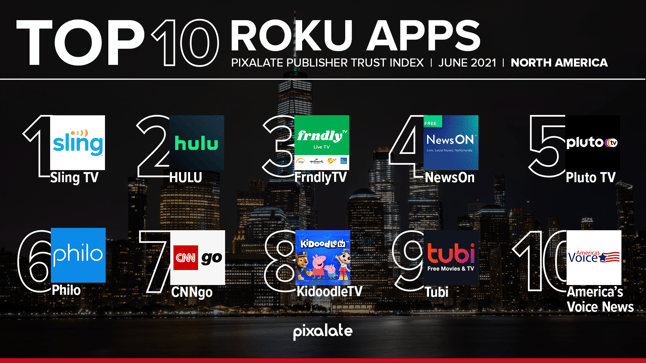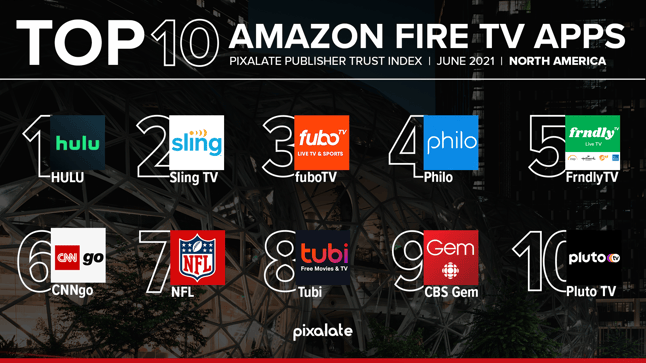


Hulu and SlingTV achieved the top two spots in the CTV Publisher Trust Indexes in June in North America. Disney’s streaming platform reached first place in Amazon Fire TV ranking, while SlingTV secured the top rank in Roku classification. Both apps were runner-ups in rankings they didn’t win.
Hulu remained at the top of Roku ranking
Hulu maintained almost perfect ad quality from May and scored exactly the same as it did last month to remain at the top of Amazon Fire TV ranking. It is worth mentioning that the app scored at least 96 in all measured metrics, including a perfect 99 in three categories - Popularity, Ad Density, and User Engagement.
SlingTV rising in Amazon Fire TV classification
SlingTV dethroned Hulu from the first place in Roku ranking by achieving the highest grade, “A”, across all metrics. The consistent and excellent performance allowed the app to rise from the second spot last month to the top. It’s worth noting that SlingTV obtained the highest score (96) among the top 10 apps in the Invalid Traffic category.
Debutant in the Amazon Fire TV top 10
CBC Gem debuted in the top 10 best quality CTV apps for advertisers in June in Amazon Fire TV ranking. After reaching the 38th position in May, the app visibly improved its Popularity and Engagement metrics scores to achieve A’s in all measured categories. Thanks to improvements, CBC Gem earned 9th place in June’s edition of the Publisher Trust Index.
Disclaimer
The content of this blog, and the Publisher Trust Indexes (collectively, the “Indexes”), reflect Pixalate’s opinions with respect to factors that Pixalate believes may be useful to the digital media industry. The Indexes examine programmatic advertising activity on mobile apps and Connected TV (CTV) apps (collectively, the “apps”). As cited in the Indexes and referenced in the Indexes’ key findings reproduced herein, the ratings and rankings in the Indexes are based on a number of metrics (e.g., “Brand Safety”) and Pixalate’s opinions regarding the relative performance of each app publisher with respect to the metrics. The data is derived from buy-side, predominantly open auction, programmatic advertising transactions, as measured by Pixalate. The Indexes examine global advertising activity across North America, EMEA, APAC, and LATAM, respectively, as well as programmatic advertising activity within discrete app categories. Any insights shared are grounded in Pixalate’s proprietary technology and analytics, which Pixalate is continuously evaluating and updating. Any references to outside sources in the Indexes and herein should not be construed as endorsements. Pixalate’s opinions are just that, opinions, which means that they are neither facts nor guarantees; and neither this press release nor the Indexes are intended to impugn the standing or reputation of any person, entity or app.
*By entering your email address and clicking Subscribe, you are agreeing to our Terms of Use and Privacy Policy.
These Stories on CTV
*By entering your email address and clicking Subscribe, you are agreeing to our Terms of Use and Privacy Policy.

Disclaimer: The content of this page reflects Pixalate’s opinions with respect to the factors that Pixalate believes can be useful to the digital media industry. Any proprietary data shared is grounded in Pixalate’s proprietary technology and analytics, which Pixalate is continuously evaluating and updating. Any references to outside sources should not be construed as endorsements. Pixalate’s opinions are just that - opinion, not facts or guarantees.
Per the MRC, “'Fraud' is not intended to represent fraud as defined in various laws, statutes and ordinances or as conventionally used in U.S. Court or other legal proceedings, but rather a custom definition strictly for advertising measurement purposes. Also per the MRC, “‘Invalid Traffic’ is defined generally as traffic that does not meet certain ad serving quality or completeness criteria, or otherwise does not represent legitimate ad traffic that should be included in measurement counts. Among the reasons why ad traffic may be deemed invalid is it is a result of non-human traffic (spiders, bots, etc.), or activity designed to produce fraudulent traffic.”

